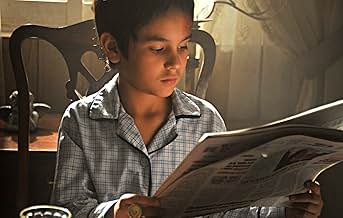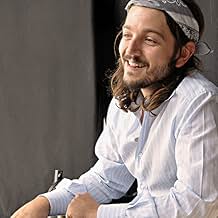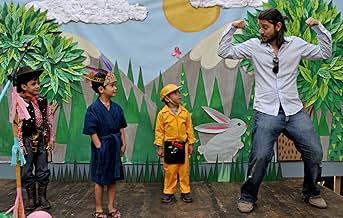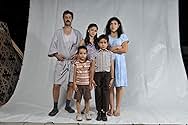NOTE IMDb
6,8/10
1,5 k
MA NOTE
Ajouter une intrigue dans votre langueAbout a peculiar young boy who, as he blurs reality and fantasy, takes over the responsibilities of a family man in his father's absence.About a peculiar young boy who, as he blurs reality and fantasy, takes over the responsibilities of a family man in his father's absence.About a peculiar young boy who, as he blurs reality and fantasy, takes over the responsibilities of a family man in his father's absence.
- Récompenses
- 2 victoires et 8 nominations au total
Geraldine Galván
- Selene
- (as Geraldine Alejandra)
Marcela Ruiz Esparza
- Maestra
- (as Marcela Ruíz Esparza)
Histoire
Le saviez-vous
- AnecdotesFirst feature film directed by Diego Luna. His first and previous effort as director was a documentary.
- ConnexionsFeatures La oveja negra (1949)
- Bandes originalesAbel
Written and Performed by Julieta Venegas
Commentaire à la une
From a brief description, Abel sounds like a lighthearted comedy. A boy, possibly autistic, takes charge in his household when he realizes that his mother is struggling to raise her three children. After staying up all night watching Pedro Infante movies, he begins to act like a father, taking care of his younger brother and older sister. However, problems arise when he takes his role too far. The film gets slightly disturbing when Abel begins thinking he is actually an adult. There are predictably cute moments that occur when a child acts like an adult, but they are constantly undermined by slightly disturbing moments. Don't get me wrong, Abel is still somewhat of a comedy, but it has a much darker side.
Luna is clearly well versed in Lacan (or, at the very least, he's read Mulvey). Abel's problem is with his identification. Something went wrong in the mirror stage and now his entire understanding of the symbolic order is incorrect. He rejects the name of the father and things get strangely Oedipal. In a climactic sequence, Abel's father makes use of a mirror in an attempt to correct Abel's identificatory issues.
Usually, Lacan is evoked for commentaries on the medium itself. Luna gives the ideas a fresh take by tackling them within the plot. If you've read Lacan or are familiar with his ideas, you'll definitely get a kick out of this film. Even if you haven't (but if you're interested in film, you should definitely read Mulvey's short article Visual Pleasure and Narrative Cinema) you can still enjoy the film as a bizarre story about a kid who challenges his absent father.
Luna is clearly well versed in Lacan (or, at the very least, he's read Mulvey). Abel's problem is with his identification. Something went wrong in the mirror stage and now his entire understanding of the symbolic order is incorrect. He rejects the name of the father and things get strangely Oedipal. In a climactic sequence, Abel's father makes use of a mirror in an attempt to correct Abel's identificatory issues.
Usually, Lacan is evoked for commentaries on the medium itself. Luna gives the ideas a fresh take by tackling them within the plot. If you've read Lacan or are familiar with his ideas, you'll definitely get a kick out of this film. Even if you haven't (but if you're interested in film, you should definitely read Mulvey's short article Visual Pleasure and Narrative Cinema) you can still enjoy the film as a bizarre story about a kid who challenges his absent father.
Meilleurs choix
Connectez-vous pour évaluer et suivre la liste de favoris afin de recevoir des recommandations personnalisées
Détails
- Date de sortie
- Pays d’origine
- Sites officiels
- Langue
- Aussi connu sous le nom de
- Абель
- Lieux de tournage
- Sociétés de production
- Voir plus de crédits d'entreprise sur IMDbPro
Box-office
- Budget
- 1 000 000 $US (estimé)
- Montant brut mondial
- 2 706 679 $US
- Durée1 heure 22 minutes
- Couleur
Contribuer à cette page
Suggérer une modification ou ajouter du contenu manquant































